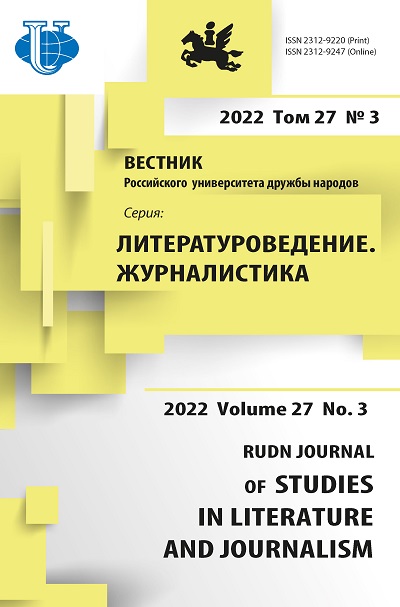Миметическое желание, соперничество между отцом и сыном и травматичный опыт в новелле И.С. Тургенева «Первая любовь»
- Авторы: Липке Ш.1,2
-
Учреждения:
- Российский университет дружбы народов
- Институт Св. Фомы
- Выпуск: Том 27, № 3 (2022)
- Страницы: 504-513
- Раздел: Литературоведение
- URL: https://journals.rudn.ru/literary-criticism/article/view/32303
- DOI: https://doi.org/10.22363/2312-9220-2022-27-3-504-513
- ID: 32303
Цитировать
Полный текст
Аннотация
В предлагаемом исследовании новелла И.С. Тургенева «Первая любовь» изучается в ключе теории об эдиповом конфликте, однако не столько согласно концепции З. Фрейда, в которой эротическое желание является основой для соперничества между отцом и сыном, а, наоборот, в свете пересмотра концепции Фрейда его последователями Ш. Ференци, Дж.М. Мейссоном и преимущественно Р. Жираром, то есть первичны травматичные взаимоотношения между сыном и родителями, на фоне которых возникает соперничество, и только в связи с этим - эротическое влечение отца и сына к одной и той же женщине. Тем не менее символы, присущие в наблюдениях в ключе фрейдизма, например детская куртка, которую мать главного героя заставляет носить в присутствии его тайной возлюбленной, вырванная ею прядь его волос, потеря им ножа, которым он намеревался убить соперника, превосходство отца в верховой езде и хлыст, которым отец бьет Зинаиду, сохраняют свое значение для исследования. Сделан вывод о том, что для новеллы первичен отказ родителей Владимира соответствовать своей роли; это одновременно становится травмой для него, а для отца - основой для эротического соперничества. Когда же сын понимает, что Зинаида стала любовницей отца и тем более, что их отношения болезненны, это становится для него столь глубокой травмой и даже символической кастрацией, что в дальнейшей жизни Владимир неспособен любить и преодолевать обстоятельства ради осуществления своих намерений. В этой связи он скорее доживает свою жизнь и остается холостым.
Ключевые слова
Об авторах
Штефан Липке
Российский университет дружбы народов; Институт Св. Фомы
Автор, ответственный за переписку.
Email: stephanlipkesj@gmail.com
ORCID iD: 0000-0001-9072-6945
кандидат филологических наук, доцент кафедры истории философии, Российский университет дружбы народов, директор Института Св. Фомы
Российская Федерация, 117198, Москва, ул. Миклухо-Маклая, д. 6; Российская Федерация, 105005, Москва, ул. Фридриха Энгельса, д. 46, стр. 4Список литературы
- Боева Г.Н. Предвкушение фрейдизма: опыт интерпретации И.С. Тургенева «Первая любовь» // IV Фрейдовские чтения: сборник научных трудов по материалам международной научно-практической конференции / под ред. М.М. Решетникова. СПб.: Восточноевропейский институт психоанализа, 2019. С. 80-92
- Гинзбург Л.Я. О психологической прозе. М.: INTRADA, 1999. 416 с.
- Жирар Р. Достоевский. От двойника к единству // Критика из подполья. М.: Новое литературное обозрение, 2012. С. 41-133.
- Жирар Р. Козел отпущения / пер. с французского Г. Дашевского. СПб.: Изд-во Ивана Лимбаха, 2010. 336 с.
- Жирар Р. Насилие и священное / пер. с французского Г. Дашевского. Изд. 2-е, испр. М.: Новое литературное обозрение, 2010. 448 с.
- Кибальник С.А. К вопросу о философии любви в творчестве Тургенева и Достоевского // Спасский вестник. 2014. № 22. С. 20-24.
- Маркович В.М. Человек в романах И.С. Тургенева. Л.: Изд-во Ленинградского университета, 1975. 152 с.
- Родин К.А. Достоевский Бахтина и Достоевский Рене Жирара: сравнительный анализ // Respublica Literaria. 2021. Т. 2. № 3. С. 42-51. http://doi.org/10.47850/RL.2021.2.3.42-51
- Родин К.А. Треугольник желания Рене Жирара и сознание подпольного человека в «Записках из подполья» Ф.М. Достоевского // Вестник Томского государственного университета. Философия. Социология. Политология. 2020. № 58. С. 97-104. http://doi.org/10.17223/1998863Х/58/10
- Топоров В.Н. Странный Тургенев (четыре главы). М.: Российский государственный гуманитарный университет, 1998. 192 с.
- Тургенев И.С. Полное собрание сочинений и писем: в 30 т. / АН СССР, ИРЛИ (Пушкинский дом). М.: Наука, 1978-2018.
- Фрейд З. «Я» и «Оно» / пер. Л. Голлербах // «Я» и «Оно»: труды разных лет. Тбилиси: Мерани, 1991. Кн. 1. С. 351-392.
- Шульц С.А. Макиавелли - Тургенев - Достоевский: трансформация трагикомического сюжетного мотива («Клиция», «Первая любовь», «Братья Карамазовы») // Литературоведческий журнал. 2021. № 1 (51). С. 9-20. http://doi.org/10/31249/litzhur/2021.51.01
- Ferenczi S. Confusion of tongues between adults and the child // The Assault on Truth: Freud’s Suppression of the Seduction Theory / J. M. Masson. New York: Farrar, Straus and Giroux, 1984. Pp. 283-295.
- Freud S. The Aetiology of hysteria // The Assault on Truth: Freud’s Suppression of the Seduction Theory / J. M. Masson. New York: Farrar, Straus and Giroux, 1984. Pp. 251-282.
- Masson J.M. The assault on truth: Freud’s suppression of the seduction theory. New York: Farrar, Straus and Giroux, 1984. P. xxiv.
Дополнительные файлы















